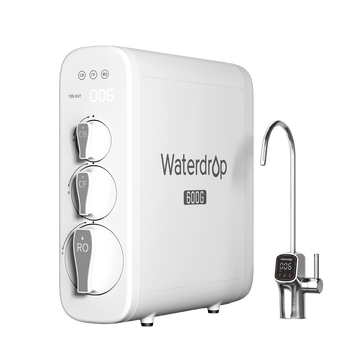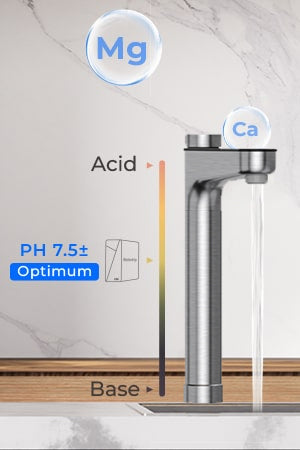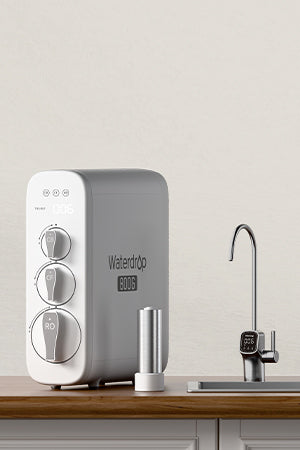In den letzten Jahren ist das Interesse an gereinigtem Wasser gestiegen, insbesondere bei Menschen, die sichergehen wollen, dass ihr Trinkwasser so sauber und sicher wie möglich ist. Aber kann man destilliertes Wasser trinken, und wie schneidet es im Vergleich zu Umkehrosmosewasser ab?
In diesem Blogbeitrag gehen wir den Unterschieden zwischen destilliertem Wasser und Umkehrosmosewasser, ihren jeweiligen Vorteilen und der Frage nach, ob das Trinken von destilliertem Wasser eine sichere Option für Ihre Gesundheit ist.
Was ist destilliertes Wasser?
Um zu verstehen, ob man destilliertes Wasser trinken kann, ist es wichtig, zunächst zu wissen, was destilliertes Wasser überhaupt ist. Destilliertes Wasser ist eine Art gereinigtes Wasser, das einem speziellen Verfahren unterzogen wird.
Destillation Bei der Destillation wird Wasser gekocht, um Dampf zu erzeugen, der dann wieder zu Flüssigkeit kondensiert wird, wobei Verunreinigungen wie Mineralien, Salze, Chemikalien und Schadstoffe zurückbleiben.
Durch dieses Verfahren werden im Wesentlichen alle gelösten Stoffe entfernt, wodurch destilliertes Wasser nahezu frei von Mineralien und anderen Elementen ist. Daher gilt destilliertes Wasser oft als die reinste Form von Trinkwasser.
Kann man destilliertes Wasser trinken?
Destilliertes Wasser ist im Allgemeinen für den kurzfristigen Konsum unbedenklich. Es ist frei von Verunreinigungen wie Bakterien, Viren und schädlichen Chemikalien und daher hygienisch unbedenklich. Da es jedoch wichtige Mineralstoffe wie Kalzium, Magnesium und Kalium nicht enthält, kann regelmäßiger Konsum Nachteile mit sich bringen.
Die potenziellen Nachteile des Trinkens von destilliertem Wasser
Destilliertes Wasser ist zwar unbedenklich trinkbar, aber für die langfristige Flüssigkeitszufuhr möglicherweise nicht die beste Wahl. Hier erfahren Sie warum.
Mangel an essentiellen Mineralien
Im Gegensatz zu natürlichem Quellwasser oder anderen Trinkwasserquellen enthält destilliertes Wasser keine gesundheitsfördernden Mineralien. Langfristig kann der Konsum von mineralstoffarmem Wasser zu einem Ungleichgewicht des Elektrolythaushalts führen und möglicherweise Herz, Muskeln und Nerven beeinträchtigen.
Flacher Geschmack
Manche Menschen empfinden destilliertes Wasser aufgrund des fehlenden Mineralstoffgehalts als geschmacklos. Wer Wasser mit etwas Geschmack bevorzugt, findet destilliertes Wasser möglicherweise weniger ansprechend.
Mineralstoffmangel
Destilliertes Wasser trägt zwar nicht wesentlich zu Ihrer täglichen Mineralstoffzufuhr bei, aber die ausschließliche Verwendung von destilliertem Wasser kann zu Mineralstoffmängeln führen, insbesondere wenn Sie nicht genügend Mineralstoffe über andere Lebensmittel oder Getränke aufnehmen.
Die Rolle von destilliertem Wasser im Alltag
Auch wenn destilliertes Wasser für die langfristige Flüssigkeitszufuhr nicht die ideale Wahl ist, hat es dennoch andere wichtige Anwendungsgebiete, insbesondere in Bereichen wie Arztpraxen, Laboren und industriellen Anwendungen, wo Reinheit von entscheidender Bedeutung ist.
Destilliertes Wasser vs. Umkehrosmosewasser: Worin liegt der Unterschied?
Der Filtrationsprozess
- Destilliertes Wasser: Wie bereits erwähnt, wird bei der Destillation Wasser erhitzt, um Dampf zu erzeugen, der anschließend wieder zu Flüssigkeit kondensiert wird. Durch dieses Verfahren werden die meisten Verunreinigungen, darunter Bakterien, Viren und Mineralien, entfernt.
- RO-Wasser: Umkehrosmose, nutzt ein semipermeable Membran Die Umkehrosmose dient der Entfernung von Verunreinigungen aus dem Wasser. Das Wasser wird unter Druck durch eine Membran gepresst, die Verunreinigungen wie Chlor, Fluorid, Schwermetalle und andere gelöste Feststoffe herausfiltert. Im Gegensatz zur Destillation erfolgt bei der Umkehrosmosefiltration kein Abkochen.
Mineralgehalt
- Destilliertes Wasser. Durch den Destillationsprozess werden die meisten Mineralien aus dem Wasser entfernt, sodass destilliertes Wasser praktisch frei von Nährstoffen wie Kalzium, Magnesium und Natrium ist.
- Umkehrosmosewasser. Umkehrosmoseanlage Durch die Umkehrosmose werden auch viele Mineralien entfernt, wobei je nach Qualität des Filtersystems einige Mineralien zurückbleiben können. Manche Umkehrosmoseanlagen verfügen über einen Nachfilter oder eine Mineralkartusche, um wichtige Mineralien wie Kalzium und Magnesium wieder zuzuführen. Dies kann den Geschmack des Wassers verbessern und zusätzliche Nährstoffe liefern.
Schadstoffentfernung
- Destilliertes WasserDestillation ist ein wirksames Verfahren zur Entfernung von Verunreinigungen wie Chlor, Pestiziden, Bakterien und Viren. Allerdings lassen sich manche Chemikalien mit einem Siedepunkt unterhalb von Wasser (wie flüchtige organische Verbindungen) möglicherweise nicht vollständig entfernen.
- UmkehrosmosewasserDie Umkehrosmose entfernt ein breiteres Spektrum an Schadstoffen, darunter viele Chemikalien, die bei der Destillation möglicherweise nicht erfasst werden. Sie kann Schwermetalle (wie Blei und Quecksilber), Chlor, Fluorid und sogar einige Arzneimittel effektiv herausfiltern.
Geschmack und Qualität
- Destilliertes WasserDer Mangel an Mineralien im destillierten Wasser führt zu einem eher neutralen Geschmack. Für Anwendungen, die höchste Reinheit erfordern, wie beispielsweise in medizinischen Geräten oder Labortests, wird dieser fehlende Geschmack jedoch als Vorteil angesehen.
- UmkehrosmosewasserUmkehrosmosewasser gilt oft als schmackhafter als destilliertes Wasser, da es einige der natürlichen Mineralien enthalten kann, insbesondere wenn das System über einen Remineralisierungsfilter verfügt. Der Geschmack ist in der Regel angenehmer, weshalb es eine beliebte Wahl für den täglichen Gebrauch ist.
Warum Umkehrosmose?
Nachdem wir nun die wichtigsten Unterschiede zwischen destilliertem Wasser und Umkehrosmosewasser verstanden haben, wollen wir uns die Vorteile des Trinkens von Umkehrosmosewasser ansehen.
Besserer Geschmack
Viele Menschen finden, dass Umkehrosmosewasser besser schmeckt als destilliertes Wasser, da es noch einige wertvolle Mineralien enthält. Der Geschmack von Wasser kann die Trinkmenge erheblich beeinflussen, und Menschen trinken tendenziell mehr, wenn es gut schmeckt. Daher kann Umkehrosmosewasser eine bessere Wahl für die Flüssigkeitszufuhr sein.
Reduzierung von Schadstoffen für sichereres Trinkwasser
Der
Umkehrosmoseanlage Es ist in der Lage, eine Vielzahl von Schadstoffen zu reduzieren, darunter Bakterien, Viren, Chlor, Fluorid, Schwermetalle (wie Blei) und vieles mehr. Dadurch ist Umkehrosmosewasser äußerst wirksam, um die Reinheit und Sicherheit Ihres Trinkwassers zu verbessern.
Gesundheitliche Vorteile essentieller Mineralstoffe
Im Gegensatz zu destilliertem Wasser kann Umkehrosmosewasser wichtige Mineralstoffe wie Kalzium und Magnesium enthalten oder sogar damit angereichert werden, die zu Ihrer allgemeinen Gesundheit beitragen. Diese Mineralstoffe unterstützen die Knochengesundheit, die Muskelfunktion und die Herz-Kreislauf-Gesundheit. Wenn Sie Umkehrosmosewasser trinken, stellen Sie nicht nur sicher, dass Ihr Wasser sauber ist, sondern versorgt Ihren Körper auch mit den Nährstoffen, die er benötigt.
Erschwinglich und zugänglich
Umkehrosmose-Filtersysteme sind weit verbreitet für den Hausgebrauch und ermöglichen Ihnen jederzeit den einfachen Zugriff auf sauberes, wohlschmeckendes Wasser. Bei ordnungsgemäßer Wartung…
Umkehrosmoseanlage kann eine kontinuierliche Versorgung mit qualitativ hochwertigem Wasser zu einem Bruchteil der Kosten von Flaschenwasser gewährleisten.
Das Waterdrop G3P800 Umkehrosmose-System filtert 800 Gallonen Wasser pro Tag und liefert schnell reines und wohlschmeckendes Wasser. Die 9-stufige Filtration und die UV-Sterilisation reduzieren effektiv schädliche Verunreinigungen und gewährleisten so sauberes und sicheres Wasser.
Fazit: Welches Wasser ist das beste für Sie?
Zusammenfassend lässt sich sagen, dass destilliertes Wasser zwar unbedenklich ist, aufgrund des Mangels an essenziellen Mineralien jedoch nicht die beste Option für eine langfristige Flüssigkeitszufuhr darstellt. Für gelegentlichen Konsum birgt es keine nennenswerten Gesundheitsrisiken. Wer jedoch eine nachhaltigere und nährstoffreichere Alternative sucht, ist mit Umkehrosmosewasser besser beraten. Umkehrosmosewasser bietet eine umfassendere Nährstoffversorgung.
Wasserfiltersystem Es entfernt eine Vielzahl von Schadstoffen und erhält gleichzeitig nützliche Mineralien, wodurch es sich hervorragend für die tägliche Flüssigkeitszufuhr eignet.
Wenn Sie in einer Gegend leben, in der die Wasserqualität ein Problem darstellt, könnte die Investition in eine Umkehrosmoseanlage die beste Wahl sein, um sicherzustellen, dass Sie Zugang zu sauberem, sicherem und mineralienreichem Wasser haben.




























































